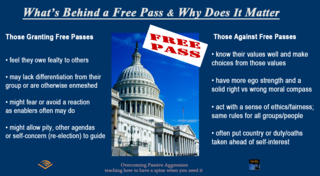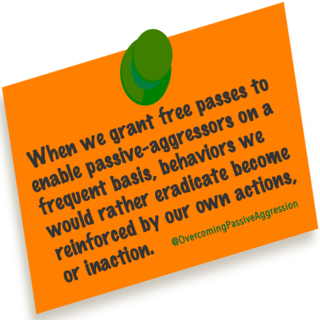Career
Stop Granting Free Passes to Difficult People
In government—at work or in life—free passes can make future misery
Posted January 13, 2021
How many times have you encountered a person who, at first impression, appears to be refreshingly honest, seemingly successful, liked by many, perhaps even charismatic?

After the January 6 attacks on the U.S. Capitol, plenty of citizens wonder how the country got to such a scary, unsettling place. Former President Donald Trump? Elected officials in Congress? Lack of accountability? Or, magical thinking that bad circumstances will fade away and not return?
A multitude of ordinary citizens, in their personal or work lives, question their lot, their individual misery. In all of these instances, there are ways forward to assure that you don't get mired in the mistake of granting free passes when they aren't deserved, nor in the public good, or fail to align with common ethical/moral decision making.
One tip off that you may become mired in your own misery is your own angst. When you become frustrated—inwardly or outwardly angry—check to see if:
You’ve granted an undeserved free pass.
The confusing thing about a free pass is that the first or sixth time you grant one, you don’t notice that anything’s amiss. You give someone the benefit of the doubt. You're taken in by charm (on a date), credentials (at work), or charisma (in politics or personal dealings).

“Passive-aggressive people possess keen skills: manipulation tops the list,” I write alongside my co-author in Overcoming Passive-Aggression: How to Stop Hidden Anger from Spoiling Your Relationships, Career and Happiness (2016). “They can have handy alibis and display a cunning charm. Ignorant of what’s truly happening, others grant free passes for the behavior until they catch on and challenge or hold the person accountable.”1
You’re using logic and reasonable expectations foolishly.
When a judge expects compliance from a difficult litigant, especially one who cannot solve problems with the other side, many can see the failure of logic.
But aren’t logic and reason good things? Yes, and hard habits to jettison when you may be better served by doing just that. As I counsel or coach clients—their being driven to sessions due to others’ oddities—I sometimes have to caution that manipulative, difficult people defy logic. They commit more thinking errors than oceans have tides. What works with self-aware or well-adjusted folks, falls flat here. Rational people assume that difficult people learn from mistakes or won't repeat them; hence, they grant free passes that in the future mire them (maybe all of us) in misery.
When dealing with difficult humans, our brains must embrace a healthy amount of skepticism. This is very important with sales pitches that sound too good to be true, sound bites that seem outlandish, and conspiracy theories that no one in the mainstream embraces. If something gets flagged or you frequently see opposition to it, there is usually a good reason for that.
The difficult person’s resistance to civility, camaraderie, and problem solving—as well as everyone’s ignorance of this process—keeps him locked. The free passes that enablers grant allows this bad actor to rehearse (again!) any or all excuses, misguided rationalizations, flat-out lies, or even inaction.
You’re too easily swayed, hop on bandwagons, or are desperate to fill a void.
In “What Mary Trump Reveals May Spark Your Own Family Journey,” I explained how a lack of differentiation impairs an individual’s capacity to think or act on one’s own in a system, whether it be a family system, an organization or an entity like the United States Congress.2 Higher levels of differentiation of self indeed relate to greater individual autonomy. An open group, with more acceptance of opinion and a less rigid need to conform, is healthier than closed systems.

Those who fail to do their own independent thinking may stem from enmeshed families where there’s a tremendous overlap in thinking and action. When you are free to investigate, question, raise objections or opinions that diverge, there’s freedom. Free thinkers are not the people who typically cobble together conspiracy theories or accept misinformation.
You have an unhealthy struggle with conflict.
Conflict exists, and it’s not at all bad. In fact, without conflict, we wouldn’t be exposed to other opinions, ideas, or solutions that might be the aha-moment we need.
Scientists study something, conduct clinical trials — for instance, in the case of the novel coronavirus — and share discoveries through publication or collegial knowledge for the betterment of their field or humankind. Conflict, or feeling stuck, drives something greater.
Conflict only becomes burdensome when a person fears or avoids new thoughts, actions, or communication. When this happens, when one gets stuck in a bad cycle, a string of lies or complications piled onto existing problems, you see a person, an office, a family, an institution, or a government in trouble.
As Congress decides the outcome of a second Impeachment trial, everyone should understand the benefits and risks inherent in granting free passes.
Copyright @ 2020 by Loriann Oberlin. All Rights Reserved.
Related Posts:
References
1. T. Murphy and L. Oberlin, Overcoming Passive-Aggression: How to Stop Hidden Anger from Spoiling Your Relationships, Career and Happiness (Boston: DaCapo Press, 2016). https://tinyurl.com/Overcoming-Passive-Aggression and https://tinyurl.com/OPA-Barnes-Noble
2. "What Mary Trump Reveals May Spark Your Own Family Journey," Psychology Today Blog, July 14, 2020. https://tinyurl.com/Mary-Trump-Revelations




